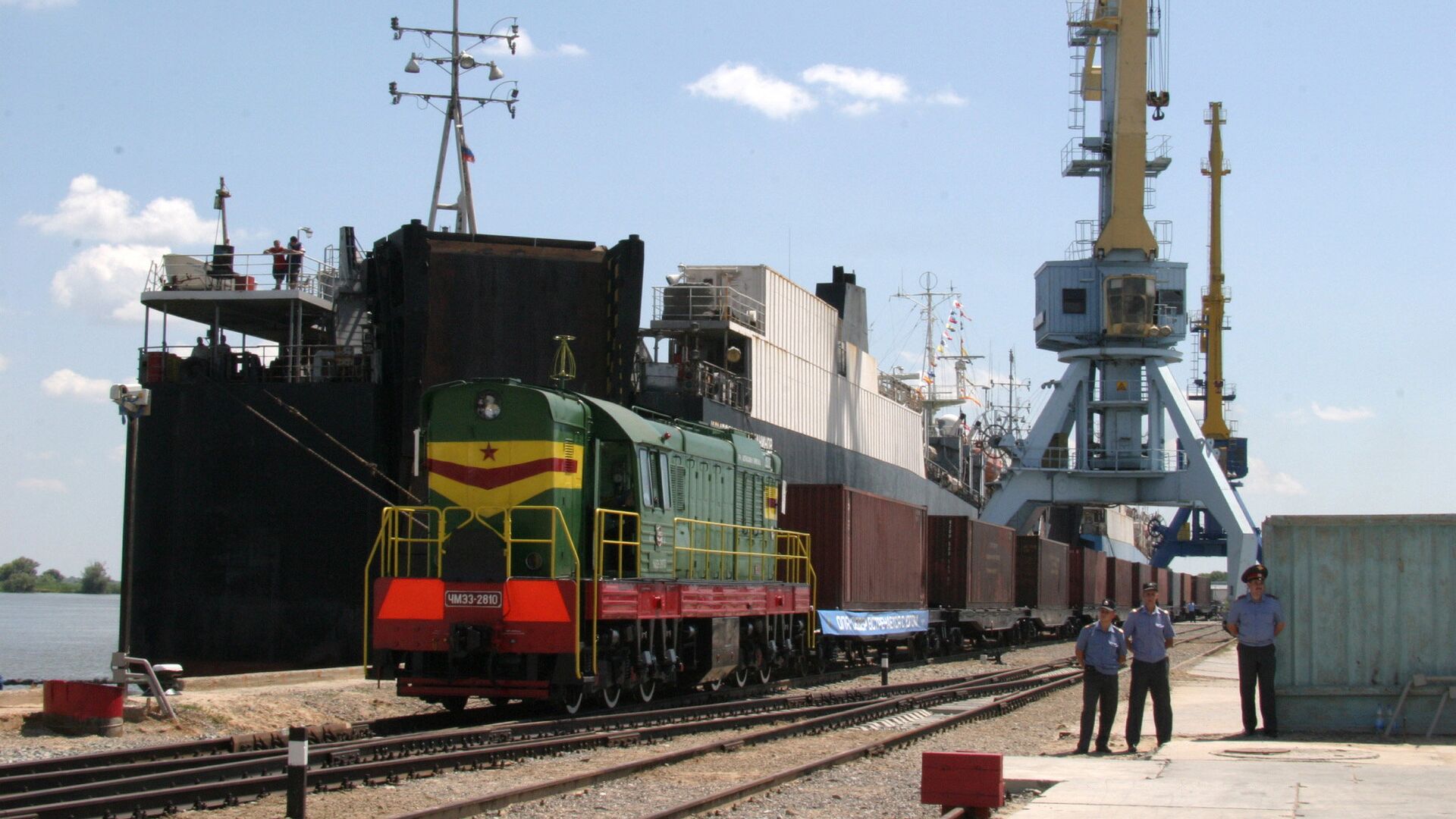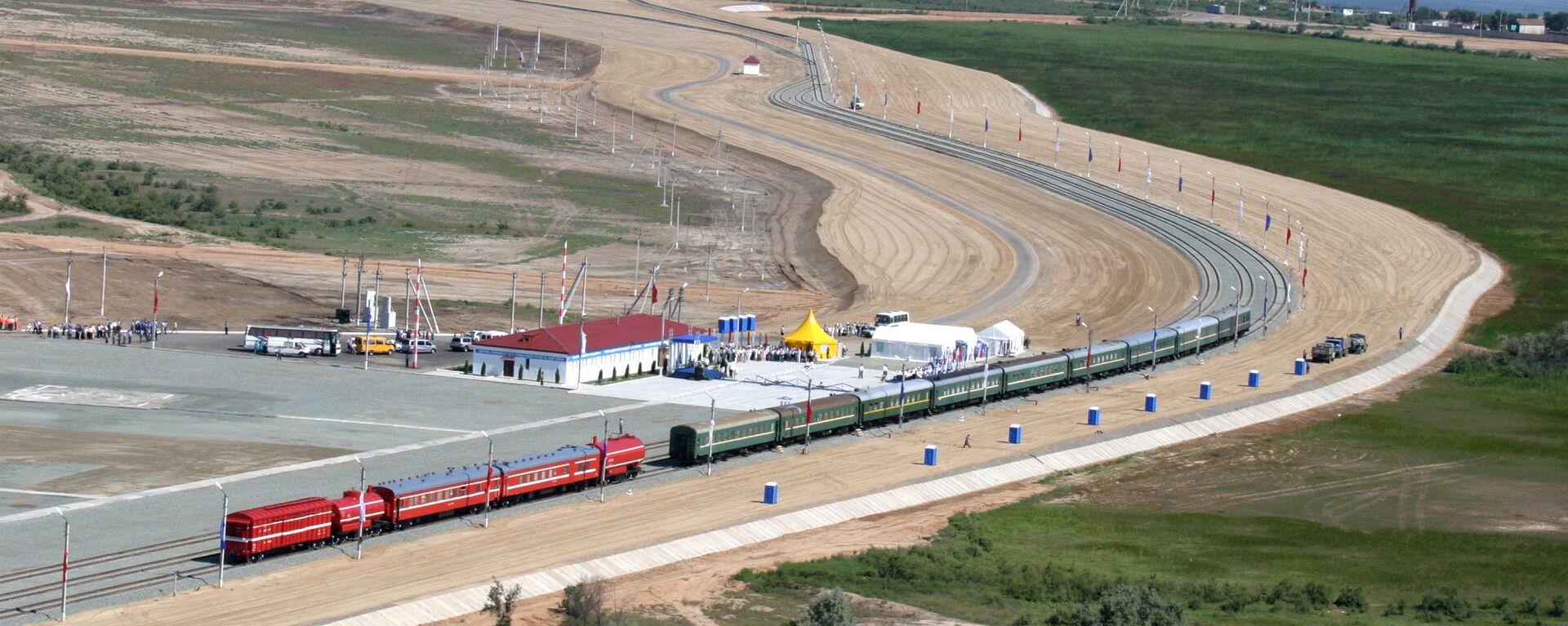The Route Linking Indian Ocean & Arctics is Suddenly Becoming Important

© Sputnik / Sergey Subbotin
/ Subscribe
Why the North-South transport corridor has suddenly become important and is being widely discussed? It’s simply because when the world is going mad, it’s only too natural to ensure that your nation controls its own trade.
It’d be too bad if the constantly changing foreign governments habitually would be telling you what to buy and sell, how to pay for it, who is your best trading partner and, also, how do you transport your merchandise. You may be the friend of everyone in the world, but at the same time you have to control your own trade with these friends, asking no one for instructions on the subject. Hence, you control your own economic development.
That simple idea of your nation’s place in the world is noticeable in the current Indian electoral debate. Just one quote from the Firstpost.com: The prime minister now fashions himself as the only leader in business who can address the higher levels of motivation in Indians, buoyed by relative economic ease, who feel more confident of their place in the world and demand concomitant international respect.
The same idea has become very hot in Russia’s current long-term national planning. Planning needs partners. Just one example: forming the new global clusters of growth is going to be the key topic of the oncoming St. Petersburg International Economic Forum in early June.
And then, suddenly, at least one part of such plans has gone up on the presidential level. This week, we were watching the President Vladimir Putin talk about the international trade routes. He named one of these as of prime importance. That is, in his words, the North-South transport corridor.
According to Putin, “It actually connects the Northern Sea Route with the Persian Gulf or, let’s say, may and should connect them... the North-South transport corridor should become an example of broad international cooperation. I mean the creation of new logistics routes for the accelerated socioeconomic development of the countries in Eurasia and the Global South… We invite all interested countries to join this project… For our part, we are ready to offer our partners access to rapidly growing markets of Asia and the Pacific”.
The mentioned trade links have become the talk of the town days before Putin’s speech in Moscow. Simply speaking, suddenly a lot of Russia’s business and political publications began to discuss the subject. The discussions might have been triggered by a Bloomberg publication, in its Supply Lines newsletter.
First of all, that publication explains very well what is the North-South transport corridor. After all, you might have heard many times about it, but regarded it as a pipe dream, just one of these grand ideas incompatible with the relatively modest Russo-Indian trade of the early 2000-s. In fact, the corridor have been under construction, step by step, ever since the mentioned time, but attracted scant attention and limited investments for many reasons.
But things are different now, and it’s definitely not only about Russo-Indian trade. Bloomberg says: Transportation capacity along the north-south route, which includes a longer rail link via central Asia and a Trans-Caspian Sea network, could increase by 85% to 35 million tonnes a year by 2030, according to the Eurasian Development Bank. It will connect Russia with Iran and India as well as potentially the rest of South Asia, the Persian Gulf and Africa. Last August, Russia sent its first direct cargo train to Saudi Arabia.
And, also: Outdated Iranian infrastructure is holding up development of the International North South Transportation Corridor connecting India to the European part of Russia. And even as accelerating climate change melts Arctic ice to make the Northern Sea Route, or NSR, a more viable option, formidable logistical challenges remain along Russia’s remote coastline. Russia is preparing to invest more than $25 billion to upgrade the route via Iran and improve facilities along the Russian Arctic shoreline, including a fleet of domestically manufactured ice-breakers. It also plans to patrol the NSR route with a network of drone bases, Izvestia newspaper reported, citing an unidentified Defense Ministry official.
And, finally, “Russia issued a 1.3 billion euro ($1.4 billion) loan to Iran last May to build a vital missing rail link that will stretch 162 kilometers (101 miles) to connect the city of Rasht along the Caspian Sea coast to Astara on the border with Azerbaijan. Once completed, the railway will allow cargo supplies from St. Petersburg to Bandar Abbas, Iran’s main export port on the Persian Gulf”.
Right, so why a trading route that used to be relatively unattended, is grabbing the headlines now? Here we turn to the same Bloomberg feature, quoting Vaishali Basu Sharma, a former consultant at India’s National Security Council Secretariat. The Russian-backed rail connection via Iran opens the way to central Asia — including crucially Afghanistan, she said, and “offers a shorter route to Europe”, so “emerging markets are finally breaking free from the hegemony created by developed countries,” she adds.
This is where our gang, the Russian experts on global politics, step in. First, let us state the obvious. Our friend and neighbor Iran is getting more important. A nation that has withstood the long sanctions pressure and managed to build up a respectable military industry is worth some respect. That nation has also found the way to retaliate to an Israeli strike in a way that did not cause a war in the Middle East, due to precise calculation of numerous factors. So we may assume Iran is there to stay, growing in economic importance.
Middle East nations are getting more important, too. And that’s not only due to their traditional export of hydrocarbons, that are not going to disappear any time soon. These nations have become a place for certain industries, as well as trading powers. Their conflict with Iran seems to be a remote possibility now, while these nations also obviously have no taste for a fight with Israel. And they like the idea of sharing control over North-South transport corridor now, when their collective economy may become more important and diversified, than before. It’s one of those new clusters of growth, mentioned above.
Here we may quote some Russian experts watching the BRICS nations, that used to produce 32% of the world GNP before BRICS’ last year’s enlargement, and hold 37% by now. It’s worth noting that most of the newcomers to the club are exactly from the Middle East.
BRICS nations are in need of several things for being sure of their future role in world’s economy of tomorrow, says Mr. Roman Volkov of the Center for macro-economic prognostics. They need more of hi-tech production in their ranks, and also their own and reliable service industries like rating agencies, and, finally, own financial and logistical infrastructure. New trade routes, free of political pressure, are fitting in the last category quite nicely.
We may safely (or, rather, unsafely) predict turbulence in all the global economy for the coming decade, with illogical attempts to create two world economic blocks, stalling a lot of growth in the process. Or, maybe, it won’t be that bad. But in any case developing new and safe trade routes won’t do any harm.
Dmitry Kosyrev is a Russian writer, author of spy novels and short stories. He also did columns for the Pioneer and Firstpost.com

